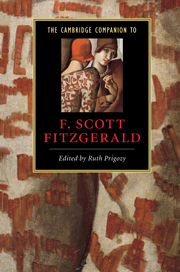Book contents
- Frontmatter
- 1 Introduction: Scott, Zelda, and the culture of celebrity
- 2 F. Scott Fitzgerald, age consciousness, and the rise of American youth culture
- 3 The question of vocation in This Side of Paradise and The Beautiful and Damned
- 4 The short stories of F. Scott Fitzgerald
- 5 The Great Gatsby and the twenties
- 6 Tender is the Night and American history
- 7 Fitzgerald’s expatriate years and the European stories
- 8 Women in Fitzgerald’s fiction
- 9 Fitzgerald’s nonfiction
- 10 Fitzgerald and Hollywood
- 11 The critical reputation of F. Scott Fitzgerald
- Bibliography
- Index
1 - Introduction: Scott, Zelda, and the culture of celebrity
Published online by Cambridge University Press: 28 May 2006
- Frontmatter
- 1 Introduction: Scott, Zelda, and the culture of celebrity
- 2 F. Scott Fitzgerald, age consciousness, and the rise of American youth culture
- 3 The question of vocation in This Side of Paradise and The Beautiful and Damned
- 4 The short stories of F. Scott Fitzgerald
- 5 The Great Gatsby and the twenties
- 6 Tender is the Night and American history
- 7 Fitzgerald’s expatriate years and the European stories
- 8 Women in Fitzgerald’s fiction
- 9 Fitzgerald’s nonfiction
- 10 Fitzgerald and Hollywood
- 11 The critical reputation of F. Scott Fitzgerald
- Bibliography
- Index
Summary
F. Scott Fitzgerald is one of the most recognized figures in American literary and cultural history, not only as one of the major writers of the twentieth century, but also as a man whose life story excites the fascination of a public that knows him primarily as the author of The Great Gatsby. Any study of Fitzgerald's career must trace its familiar trajectory: early success, then public oblivion, and finally posthumous resurrection; had he lived a few years longer, he might have proved the exception to his own belief that there are no second acts in American lives. Fitzgerald's life and work were intertwined from the very beginning; his career spanned one of the most turbulent eras of the century, and from the very start he was part creator, part victim of the new culture of celebrity which accompanied the rise of modern technology. His fame and his marriage coincided, and so today, as in the 1920s, the names of F. Scott and Zelda Fitzgerald are linked in public perception; indeed, for the last three-quarters of a century they have been indissolubly tied to American popular culture.
Scarcely a week passes that we do not notice an allusion to one or both of them in our mass media. In a bestselling paperback mystery, a leading character marries a beautiful but hopelessly mad woman who slashes the bathroom mirror with lipstick before shattering it, and then collapses bleeding on the floor. He later tells his friend, “I’ve got Zelda for a wife” (Patterson, Escape the Night, 1984, 31). In a 1970s film, Getting Straight, the protagonist, played by Elliott Gould, rebels against his questioners at an MA oral examination when they state that Nick Carraway and Gatsby have a homosexual relationship, that Jordan Baker is probably a lesbian, and that Fitzgerald, Gould’s favorite author, was driven by “a terrible need to express homosexual panic through his characters.”
- Type
- Chapter
- Information
- The Cambridge Companion to F. Scott Fitzgerald , pp. 1 - 27Publisher: Cambridge University PressPrint publication year: 2001
- 4
- Cited by



